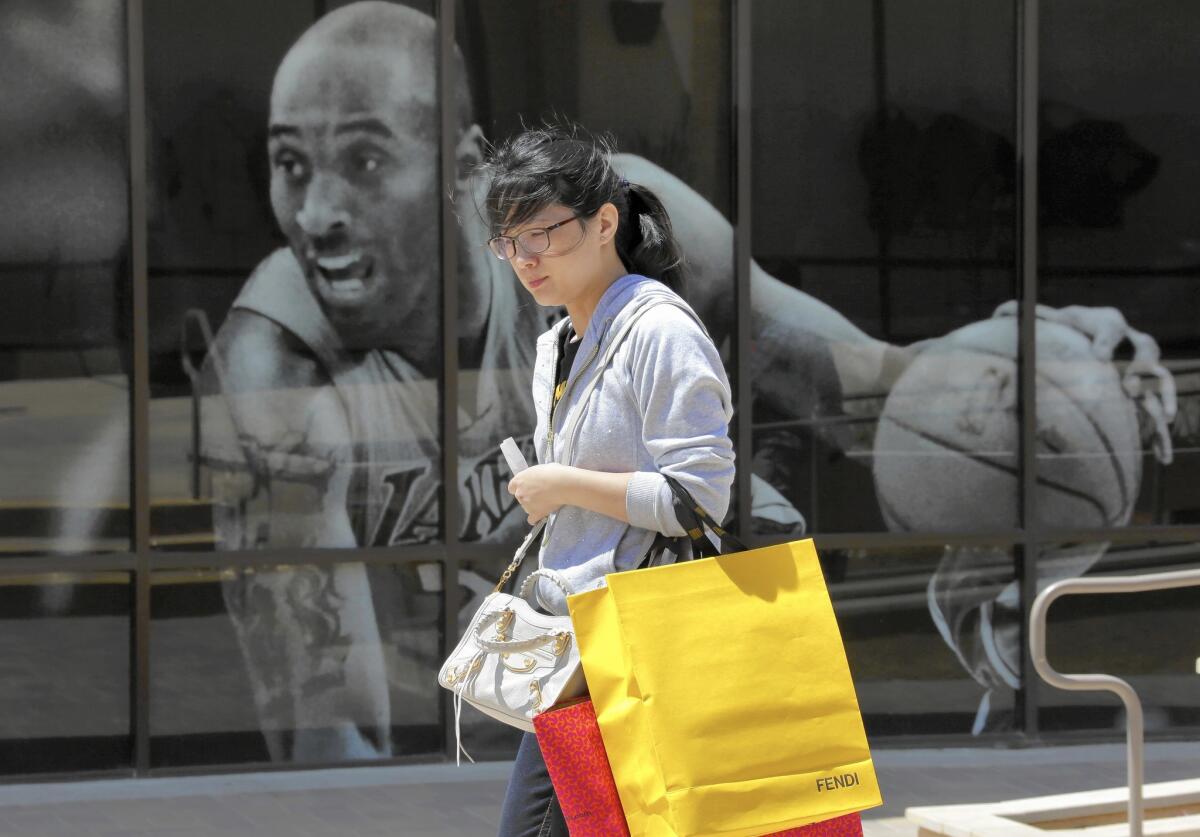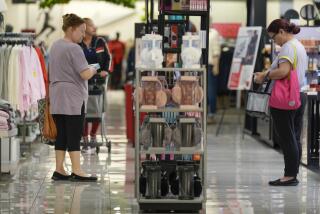Consumer caution keeps retail sales flat in April

U.S. consumers kept their money in their wallets in April, stalling retail sales despite warmer weather and the Easter holiday, which traditionally give stores a spring boost.
Retail sales were flat last month compared with March, the Commerce Department said Wednesday. The tally ticked up 0.1% without motor vehicle and parts spending, which tends to be volatile.
Analysts said shoppers continue to be wary of spending, which led to a string of lackluster months in winter before the slight climb in retail sales last month.
“Clearly consumers are not about to embark on a spending spree,” said Sung Won Sohn, an economist at Cal State Channel Islands. “Consumers’ caution is supported by less spending on discretionary items, from electronics to furniture.”
Although some experts had predicted pent-up demand would push shoppers into stores once the weather thawed, many consumers opted to pay down debt or sock away their savings from cheaper gasoline prices. And now that fuel prices have rebounded, shoppers have even less cash to splurge on trips to the mall.
At Americana at Brand on Tuesday, Mary Ovakyan, 24, said she’s curbing spending on items such as new outfits because everything is getting more expensive. The college student, who works part time as a pharmacy clerk, said she’s shelling out more for tuition and books than ever before.
“Prices are definitely going up,” the Burbank resident said. “Even clothes cost more now.”
Retail sales are considered a bellwether of consumer spending, which makes up two-thirds or more of U.S. economic activity. In April, the measure was up 0.9% from the same month in 2014.
Consumers remain in a frugal mind-set despite signs that the job market is improving. The national unemployment rate dipped to 5.4% in April, the lowest level in nearly seven years.
But the pace of wage growth, which many economists have blamed for weak retail sales, slowed sharply last month. Average hourly earnings climbed just 3 cents in April, half of March’s increase. Other obstacles for the U.S. economy include weak economies in other countries and a strong dollar, which makes U.S. goods more expensive for foreign consumers.
A West Coast ports dispute and unusually bad weather in parts of the country also depressed sales at some retailers.
Macy’s Inc. said Wednesday that its net income for the first quarter dropped nearly 14% to $193 million and sales declined 0.7% to $6.2 billion. The department store chain blamed much of the slide on lower spending by foreign tourists, bad weather and the backup at the ports of Los Angeles and Long Beach and other West Coast harbors.
J.C. Penney Co. said its net loss narrowed to $167 million, or 55 cents a share, from $352 million, or $1.15 a share, in the same quarter last year. The retailer, still in the midst of a turnaround, said sales had edged up slightly to $2.9 billion from $2.8 billion a year earlier. The company also lifted its guidance for 2015.
A few sectors showed strength.
Americans dined out in April, pushing sales at food and drinking establishments up 0.7%. Clothing and accessories shops reported growth of 0.2%. Sales at health and personal care stores grew by 0.8%.
But several categories showed a slump. Gasoline station sales slipped 0.7%. Furniture store sales fell 0.9%. Electronics shops slid 0.4%. Department store sales dropped 2.2%.
Some industry watchers expect consumers to make a comeback as summer approaches.
“Despite the weak report, the outlook remains positive,” said Scott Hoyt, senior director of consumer economics at Moody’s Analytics. “Job gains remain sufficient to tighten labor markets, which will lift earnings. Housing markets will keep improving as well, as rising house prices lift wealth and construction.”
At the Glendale Galleria on Tuesday, Chris Johnson, a consultant for a sports agency, said that he’s feeling more optimistic about the economy. The 32-year-old said he hasn’t personally seen a surge in business or pay, but he still felt comfortable plunking down $300 on T-shirts, socks and underwear.
“A lot of my family are getting jobs and finding new jobs,” the downtown Los Angeles resident said. “Things are getting better.”
Twitter: @ByShanLi
More to Read
Inside the business of entertainment
The Wide Shot brings you news, analysis and insights on everything from streaming wars to production — and what it all means for the future.
You may occasionally receive promotional content from the Los Angeles Times.











